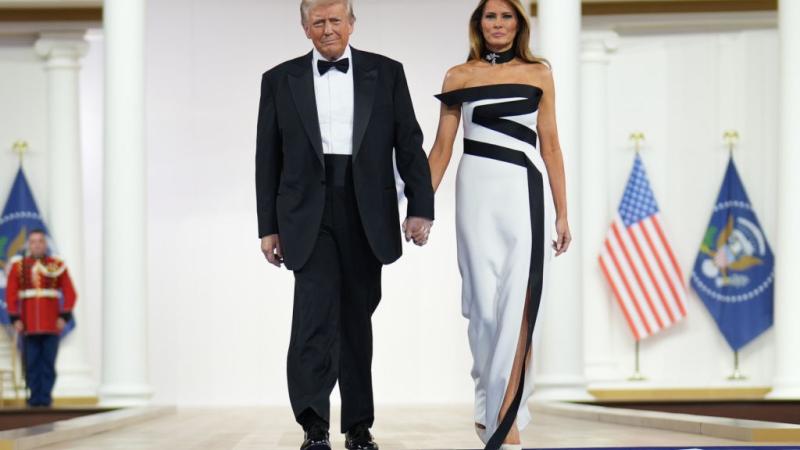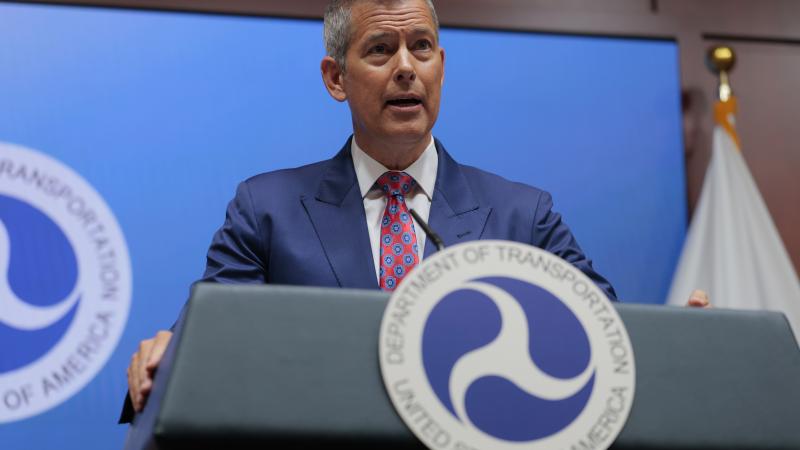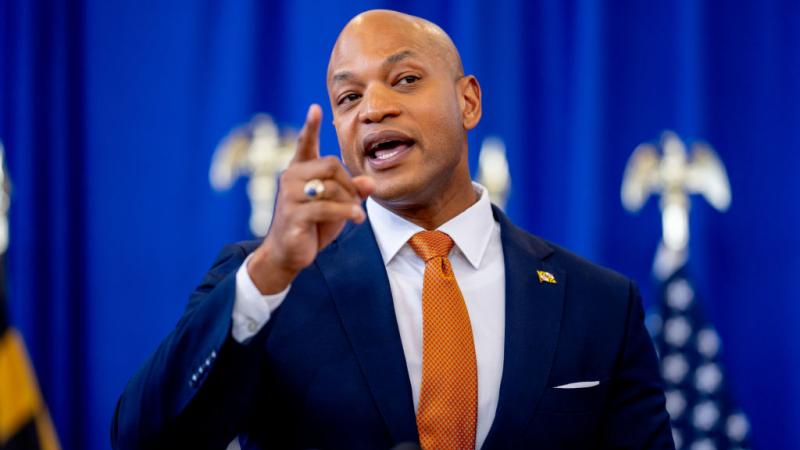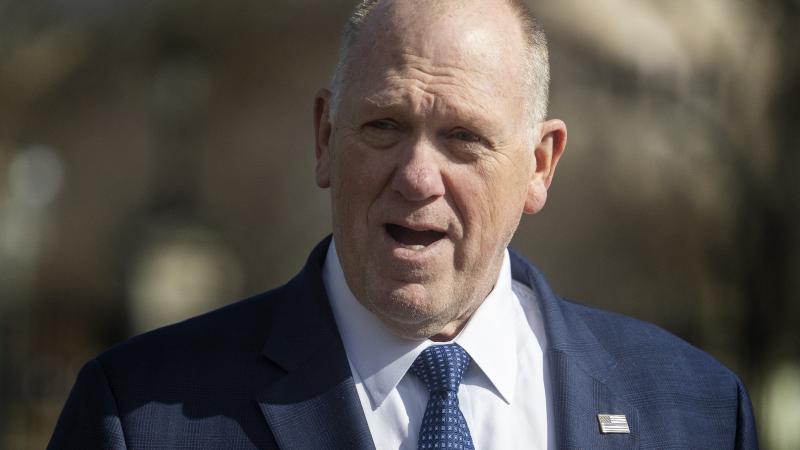In policy shift, State Department ends some bounties on Taliban’s Haqqani network leaders
Counterintuitive move in Trumpworld: The Taliban seized Afghanistan following Biden's disastrous withdrawal in 2021. Now, the Trump administration has dropped millions of dollars in bounties targeting Taliban leader Sirajuddin Haqqani.
The State Department is defending its decision to end its bounties against Taliban leader Sirajuddin Haqqani and other Haqqani Network commanders amidst indications that the United States may be adjusting its stance toward the terrorist group ruling Afghanistan.
The State Department’s Reward for Justice website had previously said that the U.S. “is offering a reward of up to $10 million for information” on Sirajuddin, a top leader in the Taliban government and a close ally of al-Qaeda. The bounty on Sirajuddin, now the head of the Taliban’s interior ministry, was first announced in 2009, and it was still in force until sometime in March.
But the bounty was dropped shortly after the Taliban agreed to free George Glezmann — an American citizen held hostage since 2022. No mention of any linkage to U.S. military or foreign policy was made.
Taliban's "blitzkreig" follows U.S. retreat
The Taliban conducted a lightning-fast takeover of Afghanistan in 2021 and swept into the Afghan capital of Kabul on August 15. The chaotic and deadly non-combatant evacuation operation by the U.S. was conducted through Hamid Karzai International Airport while the U.S. military relied upon a hostile Taliban — including the Haqqani Network — to provide security outside the airport. According to one tally conducted by the Associated Press, the Taliban, the Haqqani Network, and al-Qaeda fighters are responsible for the deaths of most of the more than 2,400 U.S. troops and the more than 1,100 NATO and other U.S. allied troops who were killed during the war.
“It is the policy of the United States to consistently review and refine Rewards for Justice reward offers,” a spokesperson for the State Department told Just the News. “While there is no current reward offer for information on these individuals, the three persons named remain designated as Specially Designated Global Terrorists (SDGTs), and the Haqqani Network remains designated as a Foreign Terrorist Organization and a SDGT.”
Late last month, the State Department also removed its $5 million bounty on Sirajuddin’s younger brother, Abdul Aziz Haqqani, and removed its $5 million bounty on Sirajuddin’s brother-in-law, Yahya Haqqani. The U.S. government is still offering a $5 million bounty for Sirajuddin’s uncle Khalil Haqqani.
Designated "Foreign Terrorist Organizations"
The Rewards for Justice websites for the three Haqqanis — Sirajuddin, Abdul Aziz, and Yahya — never made a mention of the Taliban running Afghanistan since 2021, and the website regarding Khalil Haqqani still makes no mention of it.
Sirajuddin was dubbed a specially designated global terrorist in 2008, Yahya was dubbed an SDGT in 2014, and Abdul Aziz was dubbed one in 2015. The Haqqani Network was designated as a foreign terrorist organization in 2012.
The FBI currently says that Haqqani is "a senior leader of the Haqqani network, and maintains close ties to the Taliban and al Qaeda” and notes that he “is a specially designated global terrorist.” The FBI website adds: "Sirajuddin Haqqani is wanted for questioning in connection with the January 2008 attack on a hotel in Kabul, Afghanistan, that killed six people, including an American citizen. He is believed to have coordinated and participated in cross-border attacks against United States and coalition forces in Afghanistan." The State Department said years ago that Sirajuddin “has admitted planning” that attack.
The State Department previously said of the Haqqani clan that Abdul Aziz was “involved in logistical operations and command decisions involving cross-border attacks” on U.S. and NATO forces and that he played “a key role in HQN’s operations in Kabul and in major attacks throughout Afghanistan” and that Yahya “delivered funds to HQN commanders and al-Qaeda members” and “served as HQN’s primary liaison with foreign terrorists fighting in the region.”
The State Department adds now that that Khalil Haqqani “is a senior HQN member who has raised funds for the Taliban and who has been linked to al-Qaida terrorist operations” and that he oversaw “the detention of hostages captured by HQN and Taliban fighters.”
Outdated public information from FBI
The FBI was still citing the State Department bounty on Sirajuddin as late as March 24, according to the archive website "WayBack Machine," but that citation has now been dropped. Sirajuddin remains on the FBI’s “Most Wanted” List.
The FBI website also currently includes information that is outdated by a number of years, stating that “Haqqani is thought to stay in Pakistan, specifically the Miram Shah, North Waziristan, Pakistan, area.” It is well known and publicized that Sirajuddin is part of the Taliban government in Kabul.
The FBI told Just the News that “the State Department is responsible for the Rewards for Justice program” and so “any questions related to their reward should be directed to them.”
The FBI did not respond to a request for comment on whether the “Most Wanted” designation for Sirajuddin remains in force nor on whether the bureau planned to update its website to reflect Sirajuddin’s presence leading the Taliban in Kabul.
Taliban claim connection of prisoners' release to nixing bounty
Adam Boehler, the U.S. special envoy for hostage affairs, traveled to Kabul in March to meet with Taliban officials. He was accompanied by former U.S. envoy to Afghanistan, Zalmay Khalilzad. Secretary of State Marco Rubio said last month that "George’s release is a positive and constructive step. It is also a reminder that other Americans are still detained in Afghanistan. President Trump will continue his tireless work to free ALL Americans unjustly detained around the world."
The Taliban-led Ministry of Foreign Affairs said in mid-March that Boehler and Khalilzad met with Taliban foreign minister Amir Khan Muttaqi, and that “the meeting focused on bilateral relations between Afghanistan and the United States, the release of prisoners, and the provision of consular services to Afghans residing in the United States.” The Taliban has spent years trying to gain control of Afghanistan’s embassies in countries across the world.
The Taliban announced later in March that Glezmann had been released, calling it a “humanitarian gesture” and proof of the “good faith” of the Taliban. A spokesman for the Taliban reportedly told Al Arabiya that the Taliban’s release of American hostages led to the U.S. dropping its bounties on the Haqqani Taliban leaders.
Taliban foreign ministry spokesman Zakir Jalaly told the Associated Press that the Taliban release of Glezmann and the U.S. removal of bounties demonstrated both sides were “moving beyond the effects of the wartime phase and taking constructive steps to pave the way for progress” and that “the recent developments in Afghanistan-U.S. relations are a good example of the pragmatic and realistic engagement between the two governments.”
Taliban interior ministry spokesman Abdul Mateen Qani also told the BBC that the lifting of bounties "was a result of continued diplomatic efforts" by the Taliban, saying it was “a good step, and this shows our new interaction with the world and particularly with the United States. They (the U.S. delegation) told us they want to increase positive interaction and confidence building” between the U.S. and the Taliban.
The Taliban did not respond to a request for comment from Just the News which was sent through their government website, and the U.S. Department of State has made no statement showing a connection or deal. The release was brokered by the government of Qatar, CNN reported.
“Siraj has done a remarkable job of making himself every Westerner’s favorite interlocutor in Kabul,” Taliban expert Edmund Fitton-Brown told Just the News. “Don’t assume that pragmatism is the same as moderation — it’s not. You can be a pragmatic hardliner, and that’s exactly what Siraj is.”
“The lifting of Sirajuddin’s bounty is a colossal mistake as it emboldens terrorists to kidnap Americans to extract concessions,” Bill Roggio, the senior editor of the Long War Journal, told Just the News. “Additionally, it is an indication that the Trump administration is continuing its policy of engaging the Taliban, a failed policy that led to the failed Doha Agreement and paved the way for the Biden administration’s withdrawal from Afghanistan.”
The Return of Zal
Zalmay Khalilzad was part of the U.S. effort to free American citizens from Taliban captivity. “Today is a good day. We succeeded in obtaining the release of an American citizen, George Glezmann, after two years in detention in Kabul,” Khalilzad tweeted on March 20.
Khalilzad tweeted on March 29 that “American citizen Faye Hall, just released by the Taliban, is now in the care of our friends, the Qataris in Kabul, and will soon be on her way home. Thank you, #Qatar, for your ongoing and steadfast partnership. #USA #Afghanistan.”
During Trump’s first term, Khalilzad served as the Special Representative for Afghan Reconciliation, and he was the architect of the divisive February 2020 deal between the U.S. and the Taliban which was officially known as the “Agreement for Bringing Peace to Afghanistan between the Islamic Emirate of Afghanistan which is not recognized by the United States as a state and is known as the Taliban and the United States of America” — commonly called "the Doha Agreement."
Khalilzad told Congress in 2023 that the Taliban delegation in Doha had about a dozen top members, including members of the Haqqani Network. At the time, al-Qaeda called the Doha deal a “historic victory” which would force the U.S. to “end the occupation and withdraw all occupation” forces from Afghanistan, according to the Long War Journal, and the terrorist group labeled it a “humiliating defeat” for America.
House committee: Biden's withdrawal "disastrous"
During his first term, Trump considered removing all U.S. troops from Afghanistan, but he ultimately decided to keep 2,500 U.S. forces in the country when he left office in January 2021. Then-President Joe Biden announced the unconditional withdrawal of U.S. troops from Afghanistan in an April 2021 speech, setting the withdrawal deadline for the 20th anniversary of the 9/11 terrorist attacks.
Khalilzad was kept on by the Biden administration, with then-Secretary of State Antony Blinken praising the “vital work” that Khalilzad was carrying out in Doha. Khalilzad left the position a few months after the Taliban seized Kabul.
The GOP-led House Foreign Affairs Committee’s report on the "disastrous" withdrawal from Afghanistan argued that numerous Biden administration officials “failed to execute their responsibilities on behalf of the American people and were not held accountable for the death and destruction their failures caused” and that “therefore, Congress should pass resolutions condemning” a host of figures, including Khalilzad.
The resolution submitted by then-Chairman Michael McCaul in September 2024 said that Khalilzad had “baselessly asserted the Taliban would honor their commitments and respect basic human rights.” This condemnation passed the GOP-led House.
Khalilzad responded on X that ”this statement is flatly untrue” and that “I never made such a statement.” In his lengthy post, Khalilzad said that “the Doha Agreement that I helped negotiate under President Trump did not deal with human rights” and that “President Biden decided not to condition our withdrawal on a political agreement among Afghans.”
Khalilzad did not respond to questions from Just the News.
Billions of dollars of equipment left behind
Secretary of State Rubio tweeted on January 25 that he was “just hearing the Taliban is holding more American hostages than has been reported” and that “if this is true, we will have to immediately place a VERY BIG bounty on their top leaders, maybe even bigger than the one we had on Bin Laden.” The U.S. would soon instead remove bounties following the Taliban’s release of U.S. hostages.
Trump said during a Cabinet meeting in February that he wanted the Taliban to return billions of dollars worth of U.S. military equipment which the Taliban had seized following the U.S. withdrawal in 2021. "I think they should give our equipment back… We left billions, tens of billions of dollars worth of equipment behind, brand new trucks. You see them display it every year on their little roadway…waving the flag and talking about America ... Beautiful equipment that’s all the top of the line stuff… I think we should get a lot of that equipment back."
Trump also indicated that he wanted every U.S. general responsible for the Afghan fiasco to be fired. Secretary of Defense Peter Hegseth noted during the meeting that “we’re doing a complete review of every single aspect of what happened with the botched withdrawal from Afghanistan — and plan to have full accountability.”
Taliban foreign ministry spokesman Zakir Jalaly tweeted on March 29 that the Taliban refuses to return any of the military hardware to the United States. “People don’t make deals on the assets of their states! They make agreements through long conversations and dialogues,” he said. Taliban spokesman Zabihullah Mujahid had also said at the end of February that, from the Taliban’s point of view, the Doha agreement was no longer valid, according to RadioFreeEurope / RadioLiberty. The Taliban official purportedly said that “the Islamic Emirate has its own governance system, and now we are no longer moving forward based on that agreement.”
Dorothy Shea, the acting U.S. ambassador to the UN, said on March 10 that the U.S. “is skeptical of the Taliban’s willingness to engage in good faith in the Doha Process” and that “we cannot build confidence with a group that unjustly detains Americans, has a long history of harboring terrorist groups on its soil, and ignores the basic rights and needs of its own people.”
Freedom of Movement for Sirajuddin
Sirajuddin Haqqani began breaking out of U.S. and international restrictions before Trump became president.
Biden official Tom West told Congress in January 2024 that “I think that the travel ban has been quite effective at keeping Taliban leaders in Afghanistan.” He admitted then that the U.S. had never vetoed a single request from the Taliban to travel outside Afghanistan. The UN monitoring team said in July 2024 that the UN had “approved 17 requests from seven Member States for travel by listed Taliban members from April 2023 to May 2024.”
Sirajuddin began traveling the region in 2024, despite U.S. and UN sanctions against him.
The Special Inspector General for Afghan Reconstruction assessed in July 2024 that the Taliban had “broadly increased international engagement” that year, including “visits to the United Arab Emirates and Saudi Arabia by UN-sanctioned interior minister Sirajuddin Haqqani.” The watchdog noted that “Haqqani is barred from entering UN member states and previously had not left Afghanistan since the Taliban takeover in 2021.”
Sirajuddin even began to get something of a media makeover last year. “Is Afghanistan’s Most-Wanted Militant Now Its Best Hope for Change?” a New York Times article asked in October 2024. The headline read: “Sirajuddin Haqqani has tried to remake himself from blood-soaked jihadist to pragmatic Taliban statesman. Western diplomats are shocked — and enticed.”
“What We, the Taliban, Want”
Sirajuddin Haqqani, the “deputy emir” of the Taliban, leads the day-to-day activities of the Haqqani Network. His father was a close and key ally of Osama bin Laden.
Sirajuddin wrote an opinion piece for the New York Times in February 2020 titled, “What We, the Taliban, Want.” In it, he said that “we are about to sign an agreement with the United States, and we are fully committed to carrying out its every single provision, in letter and spirit." The Taliban would go on to violate the Doha Agreement repeatedly, according to U.S. military officials.
Sirajuddin also wrote that “I am confident that, liberated from foreign domination and interference, we together will find a way to build an Islamic system in which all Afghans have equal rights, where the rights of women that are granted by Islam — from the right to education to the right to work — are protected, and where merit is the basis for equal opportunity.” This did not happen.
The Taliban leader also contended that “I am convinced that the killing and the maiming must stop.” The Taliban’s military takeover of Afghanistan would go on to kill thousands.
The close relationship between the Haqqanis and the Pakistani intelligence services (ISI) has been on display for decades. A declassified U.S. intelligence document from 2010 showed the Haqqanis and the ISI collaborated on the deadly al Qaeda terrorist attack against the CIA at Camp Chapman.
In early 2022, Sirajuddin also took personal responsibility for the 2018 attack on the Kabul Intercontinental Hotel which killed 40 people, including more than a dozen foreigners.
Then-FBI Director Christopher Wray admitted in September 2021 that “it certainly concerns me” that the leader of the Haqqani terrorist network held a key position in the Taliban government. Wray said at the time that Sirajuddin “remains on the [Most Wanted] list and the reward is still out there.” That reward offer is no longer available.
Sirajuddin's continued alliance with Al-Qaeda
Al-Qaeda was responsible for the 9/11 terrorist attacks that killed nearly 3,000 people on U.S. soil, as well as a host of other murderous attacks worldwide. The Taliban, the Haqqani network, and al Qaeda remain deeply intertwined in Afghanistan. The Washington Examiner said that the Taliban gave al Qaeda safe haven in Afghanistan before 9/11 and continued to protect al Qaeda and fight alongside it for two decades after the U.S. invasion.
“Sirajuddin Haqqani is one of the notorious terrorists in the world who is responsible for the deaths of thousands of Americans and tens of thousands of Afghans,” Bill Roggio of the Long War Journal told Just the News. “As the Taliban’s deputy emir and minister of interior, he is perhaps the most influential Taliban leader in the country. His ties to Al Qaeda and other terror groups run deep.”
The UN monitoring team said in its June 2023 report that at least three key leaders in the Taliban’s ruling government were “affiliated” or “associated” with al-Qaeda, stating that two Taliban provincial governors were “affiliated” with al-Qaeda while the Taliban’s deputy director of intelligence was also “associated” with al-Qaeda. Sirajuddin is also closely linked to al-Qaeda. The UN report also said that Sirajuddin’s ministry “continued its distribution of Afghan passports and tazkiras (national identity cards) to al-Qaeda members with advisory roles in main Afghan cities.”
Another U.N. agency, the United Nations Analytical Support and Sanctions Monitoring Team, released a February report to the U.N. Security Counsel this year detailing the terrorist threat emanating from Afghanistan and highlighting the continued alliance between the Taliban and al-Qaeda.
"Like treating a cold with a shot of malaria"
“With over two dozen terrorist groups operating in Afghanistan, Member States assessed the security threat emanating from the country as a continuing driver of instability in the region and beyond,” the UN monitoring team said. The group added: “The Taliban maintained a permissive environment allowing Al-Qaida to consolidate, with the presence of safe houses and training camps scattered across Afghanistan.”
Sayf al-Adel is believed by the FBI to be the current de-facto head of al-Qaeda, and the UN team assessed his “strategy to reorganize Al-Qaida’s presence in Afghanistan and reactivate sleeper cells in Iraq, Libya, the Syrian Arab Republic, and Europe to be indicative of the group’s longer-term intent to carry out external operations.” He is currently believed to be based in Iran, and the UN monitoring team assessed in 2024 that “several Member States noted individuals travelling to provide liaison between” al-Adel in Iran “and senior al-Qaeda figures in Afghanistan.”
Sayf al-Adel called upon terrorists and al-Qaeda members in June 2024 to travel to the safe haven of Afghanistan to have their terror skills honed by the Taliban: “The loyal people of the Ummah [worldwide Islamic community] interested in change must go to Afghanistan, learn from its conditions, and benefit from their [the Taliban’s] experience.”
The UN team had also assessed that “Al-Qaeda members have received appointments and advisory roles in the Taliban security and administrative structures” because of the Taliban, and that “interlocutors confirmed that the Taliban provided al-Qaeda with monthly ‘welfare payments,’ with portions of those payments filtered down to fighters of al-Qaeda affiliated groups.”
More ominously, the UN team also said that al-Qaeda had “established new training camps” in multiple Afghan provinces and had established “safe houses” in major cities such as Kabul. Fitton-Brown, the former coordinator of U.N. sanctions on the Taliban, told Just the News that “the U.S. is still stuck on this idea that the Taliban can be a counterterrorism partner” but that “there is a moral and practical hazard of trying to do counterterrorism work with the Taliban.”
Fitton-Brown, who is now senior advisor to the Counter Extremism Project, added that “if you go to the point of embracing allies of al-Qaeda to fight ISIS-K… it’s like treating a cold with a shot of malaria.”
The annual threat assessment of the U.S. intelligence community, released by the Office of the Director of National Intelligence in March, does not mention the Afghan Taliban nor the presence of al-Qaeda in Afghanistan.
Haqqani's Taliban take Kabul
Then-President Biden in December last year said that among his “Key Accomplishments” was that he had “ended the longest war in American history.” That ended with a Taliban takeover. The Treasury Department said that the Haqqani Taliban maintained close links with al-Qaeda prior to and following the withdrawal, and played a key role in the Taliban takeover.
The Treasury Department revealed in early January 2021 that al-Qaeda was “gaining strength in Afghanistan while continuing to operate with the Taliban under the Taliban’s protection.” The department said “senior Haqqani Network figures have discussed forming a new joint unit of armed fighters in cooperation with and funded by al-Qaeda.”
A Taliban spokesman released a statement in January 2021 rejecting the U.S. assessment as “warmongering” and “propaganda.” The Taliban also falsely claimed that “there are no al-Qaeda operatives present in Afghanistan.” Sirajuddin Haqqani made it abundantly clear in a triumphalist February 2021 speech given before a “great assembly of mujahedeen” that the Taliban saw total conquest of Afghanistan as its end goal, according to the Long War Journal, saying that “I congratulate you on your Jihadi victories and successes in the path of freedom of our country.”
The UN monitoring team made clear in late April 2021 that “both deputy leaders of the Taliban” — Mullah Yaqoob and Sirajuddin Haqqani — “are reported by Member States to oppose peace talks and favor a military solution” to taking over Afghanistan.
Hamdullah Mohib, the now former national security adviser to former Afghan president Ashraf Ghani, told The New Yorker that Khalil Haqqani called him personally in mid-August 2021 and asked him to surrender: “I explored their desire for negotiations, but it was clear they were set on a military victory.”
Khalil Haqqani, the uncle of Sirajuddin, was made head of security for Kabul after the Taliban took it over, according to Foreign Policy. The Wall Street Journal later assessed that the “success of Kabul’s undercover network, loyal to the Haqqanis, changed the balance of power within Taliban after the U.S. withdrawal.” The outlet reported that, on the morning of August 15, “a large underground network of urban operatives” from the Haqqani Network and its Badri forces, already prepositioned inside of Kabul, were activated to begin taking control of the Afghan capital.
Sirajuddin admitted the obvious in a 2022 CNN interview, saying that “we wanted to take over the government” of Afghanistan — though he claimed the Taliban had wanted to do so “by peaceful means.”
Haqqanis waiting outside the airport gates as U.S. evacuates
The Haqqani Taliban seized Kabul and had a significant presence just outside the gates of Kabul airport as the U.S. conducted its evacuation. A retired senior British diplomat, Ivor Roberts, told Voice of America at the time that putting Haqqani Network leaders in charge of security of Kabul was akin to the “fox being put in charge of a chicken coop.”
The Wall Street Journal reported that the Haqqani Network’s "Badri 313" forces “took control of the airport’s perimeter” on August 15. The Taliban also began posting pictures of Badri 313 units around the Kabul airport, according to the Long War Journal.
John Bass, a former U.S. ambassador to Afghanistan who was sent to Kabul during the evacuation, told Congress in 2024 that he "could not recall" if any Haqqanis were outside the airport nor if the U.S. military ever communicated with any Haqqanis during the evacuation. Ross Wilson, the U.S. ambassador to Afghanistan in 2021, claimed to Congress in 2023 that “I am not aware that we ever had granularity as to what brand of Taliban was responsible for the airport area common.”
Contradicting the notion that the U.S. was caught off-guard, then-CENTCOM Commander Frank McKenzie had told the House in September 2021 that “yes, we do” know which Taliban forces had been providing security at the Kabul airport, and admitted that the Taliban’s Haqqani-linked Badri 313 suicide units were “part of” the Taliban forces providing security at Kabul airport.
Major General Buck Elton and Captain Joshua Fruth also wrote in late 2021 that they had “observed the Haqqani Network’s Badri 313 unit placed in charge of security at Hamid Karzai International Airport prior to an ISIS–K attack that killed 13 U.S. service members.”
Biden's State Department calls Taliban and Haqqanis “separate”
The State Department repeatedly insisted in 2021 that the Taliban and the Haqqani Network are "separate entities," arguing the United States providing information to the former did not mean it had been doing the same with the latter.
State Department spokesman Ned Price was asked on August 27 — the day after the Abbey Gate bombing at the airport — if U.S. coordination on security with the Taliban extended to the Haqqani Network, and he replied, “No, it does not. The Taliban and the Haqqani Network are separate entities. … We are not coordinating with the Haqqani Network.”
The Pentagon said on August 28 that there was “marbling” and “commingling” between the Taliban and the Haqqani network even as the State Department defended calling the two groups "separate entities.” Biden national security adviser Jake Sullivan had previously said on August 22 — days before the Abbey Gate bombing — that “the Taliban, obviously, to a considerable extent, are integrated with the Haqqani network. Our effort is with the Taliban military commanders currently in charge of security in Kabul.”
The Haqqanis and the Taliban take issue with the Biden position of "separateness" and have long insisted they are indeed one united group.
Salman Ahmed, the State Department’s director of policy planning during the Afghan withdrawal, told Congress in 2023 that the Haqqanis “were part and parcel of the Taliban” when asked if he believed that the Haqqanis and the Taliban were “separate entities” as Ned Price had contended. Ahmed said that the Haqqanis “were a faction among the Taliban” and that “they were part of the Taliban that ultimately took control.”
The State Department declined to answer questions posed by Just the News on this topic.
Questions of Collusion between the Haqqanis and ISIS-K
An ISIS-K suicide bomber named Abdul Rahman al-Logari — who had been freed by the Taliban from a prison at Bagram Air Base in mid-August 2021 mere weeks after the U.S. abandoned the base — has been identified as having carried out the suicide attack at Abbey Gate. That murder spree killed 13 U.S. service members and an estimated 170 Afghan civilians while wounding dozens of other U.S. troops and scores of Afghans in the crowd, on August 26, 2021.
Despite the U.S. servicemens' deaths, then-President Biden declared falsely at the 2024 debate that "I'm the only president this century that doesn't have any [...] troops dying anywhere in the world."
Trump announced in March that the U.S. had extradited one of the ISIS-K terrorists responsible for the Abbey Gate attack. Mohammad Sharifullah, captured with the help of Pakistani intelligence, was extradited to the U.S. last month. The FBI said that Sharifullah confessed to being involved in “route reconnaissance” in the lead-up to the Abbey Gate attack.
The FBI said Sharifullah also confessed to a role in facilitating a June 2016 suicide bombing attack which killed more than ten guards tasked with protecting the Canadian embassy. At the time, that suicide bomber was widely reported to have been part of the Taliban — not ISIS-K — and the Taliban claimed responsibility for the attack.
Taliban expert Fitton-Brown told Just the News that “the Taliban must understand that Sharifullah’s past is a vulnerability.”
The UN monitoring team said in 2020 that some countries noted that most ISIS-K attacks include “involvement, facilitation, or the provision of technical assistance” by the Haqqani Network, and that ISIS-K “lacked the capability to launch complex attacks in Kabul on its own” without Haqqani help. The UN team also said it had “viewed communication intercepts in the wake of attacks that were claimed by ISIS-K that were traceable to known members of the Haqqani Network.”
The UN team said that “some countries “have reported tactical or commander-level collaboration between ISIL-K and the Haqqani Network.” According to Arab News, Taliban spokesman Zabihullah Mujahid said that “we strongly reject this propaganda” and that “we have nothing in common (and don’t operate cells) with Daesh [ISIS-K].”
Sanaullah Ghafari, the head of ISIS-K, still has a $10 million U.S. bounty on his head. The UN monitoring team said in 2021 that one nation said that Ghafari was “previously a mid-level commander in the Haqqani Network” and that he continued to maintain cooperation with the Haqqanis. One UN member state said in June 2021 that ISIS-K leader Ghafari’s ongoing relationship with the Haqqanis provided ISIS-K with “key expertise and access to [attack] networks.”
General Austin Scott Miller, the commander of U.S. Forces in Afghanistan through July 2021, told Congress in 2024 that “I could never verify a Haqqani-ISIS nexus.” West Point’s Counterterrorism Center published an article in 2022 stating that Ghafari had joined “Taliban factions affiliated with the Haqqani network” and “had close links to the Haqqani network’s senior commanders.”
Major General Buck Elton and Captain Joshua Fruth assessed in late 2021 that “the Taliban may have leveraged ISIS–K as a proxy strawman layer of separation to oversee and/or facilitate the attack on U.S. service members and Afghan civilians” at the airport.
A report last year by Sarah Adams, a writer and former CIA analyst, concluded that the bombing plot “was a coordinated effort between the Haqqani Network and the Islamic State-Khorasan Province, with their leaders, Sirajuddin Haqqani and Sanaullah Ghafari, acting as joint masterminds.”
The State Department and the FBI did not answer questions from Just the News on whether the U.S. had investigated possible Haqqani collusion in the attack.
Bin Laden's Successor in Kabul
Ayman al-Zawahiri took over al-Qaeda after its founder, Osama bin Laden, was killed in a U.S. special forces raid while hiding out in Pakistan in 2011. Zawahiri and bin Laden had both pledged allegiance to top Taliban leaders.
Zawahiri quickly moved to Afghanistan following the American retreat and the Taliban rise to power. The U.S. carried out a successful air strike against Zawahiri at the end of July 2022. The strike killed Zawahiri when he was on the balcony of his Kabul safehouse.
Sirajuddin had given a rare interview in early 2022 where he claimed the Taliban was “committed to the Doha agreement” — one of whose requirements was that the Taliban not allow al Qaeda to pose a threat to the United States in Afghanistan. Sirajuddin reportedly hosted Zawahiri in his home that summer.
A senior Biden-Harris Administration official said in 2022 that senior Haqqani Taliban were aware that Zawahiri was in Kabul, and that Haqqani Taliban members took quick action to try to conceal Zawahiri’s presence at the safehouse following the strike.
The Taliban quickly lambasted the U.S. strike against Zawahiri, saying that it “strongly condemns this attack and calls it a clear violation of international principles and of the Doha agreement.” The Taliban’s leadership in shielding al Qaeda’s in the capital city is also ostensibly a violation of the Doha agreement.
“The Islamic Emirate of Afghanistan has no information about Ayman al-Zawahiri’s arrival and stay in Kabul,” the Taliban claimed. “The fact that America invaded our territory and violated all international principles, we strongly condemn the action once again. If such action is repeated, the responsibility of any consequences will be on the United States of America.”
A spokesman for the Taliban’s interior ministry —- run by Sirajuddin — falsely claimed that “there were no casualties as the house was empty.”
Wray was “not surprised, but disappointed” that Zawahiri was in a Kabul home owned by the Haqqanis when he was killed. Wray said that it told the U.S. “nothing good” about the ongoing relationship between the Taliban and al Qaeda. The FBI director testified that “the recent Zawahiri strike reinforces the threat of foreign terrorist organizations like al Qaeda attempting to reconstitute in Afghanistan.”
The Associated Press reported the safe house where Zawahiri was staying “was the home of a top aide to senior Taliban leader Sirajuddin Haqqani” according to a “senior U.S. intelligence official.” The New York Times originally said “the house that was struck was owned by a top aide to Sirajuddin Haqqani” according to “one American analyst” — although it modified that to saying that “the safe house was owned by an aide to senior officials in the Haqqani network” in a subsequent story.
Taliban expert Fitton-Brown told Just the News that “there is not a shadow of a doubt that the Haqqani Network and Siraj in particular were responsible for Zawahiri’s presence in Kabul.”
The Biden administration repeatedly declined to publicly confirm reports of Sirajuddin Haqqani’s direct role in hiding Zawahiri while in Kabul. The Trump State Department also declined to answer this question to Just the News.
The Facts Inside Our Reporter's Notebook
Links
- Reward for Justice website
- previously noted
- first announced
- still in force
- agreed to free
- lightning-fast takeover
- chaotic and deadly
- provide security
- conducted by the Associated Press
- killed during the war.
- removed
- $5 million bounty
- removed
- $5 million bounty
- still offering
- dubbed
- dubbed
- dubbed
- designated
- said years ago
- previously said of the Haqqani clan
- still citing
- remains
- U.S. special envoy
- said
- gain control of Afghanistanâs embassies
- announced
- said last month
- reportedly
- told
- told
- brokered by
- told
- tweeted
- tweeted
- the divisive February 2020 deal
- told
- âhistoric victoryâ
- praising the âvital workâ
- report
- submitted
- passed
- responded
- tweeted
- said
- noted
- tweeted
- said
- said
- told Congress
- admitted then
- said
- began traveling the region
- assessed
- article
- close and key ally
- opinion piece
- U.S. military officials.
- declassified U.S. intelligence document
- took personal responsibility
- admitted
- Taliban gave al Qaeda safe haven
- report
- closely linked to al-Qaeda.
- said
- terrorist threat emanating
- is believed by the FBI
- current de-facto head
- currently believed
- assessed
- called upon
- assessed
- said
- Counter Extremism Project
- released
- said
- revealed
- âwarmongeringâ and âpropaganda.â
- âgreat assembly of mujahadeenâ
- made clear
- told
- head of security for Kabul
- assessed
- admitted
- told
- reported
- posting pictures
- told
- claimed
- told
- wrote
- asked
- âmarblingâ and âcomminglingâ
- "separate entities.â
- said
- long insisted
- told
- announced
- said
- confessed
- reported
- claimed responsibility
- said
- said
- U.S. bounty on his head.
- said
- said
- said
- told
- Biden declared falsely at the 2024 debate
- article
- assessed
- concluded
- took over al-Qaeda
- rare interview
- said
- quickly lambasted
- claimed
- falsely claimed
- ânot surprised, but disappointedâ
- testified
- reported
- originally said
- modified
- said
- repeatedly declined















